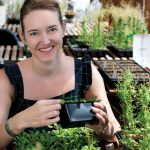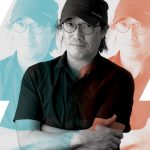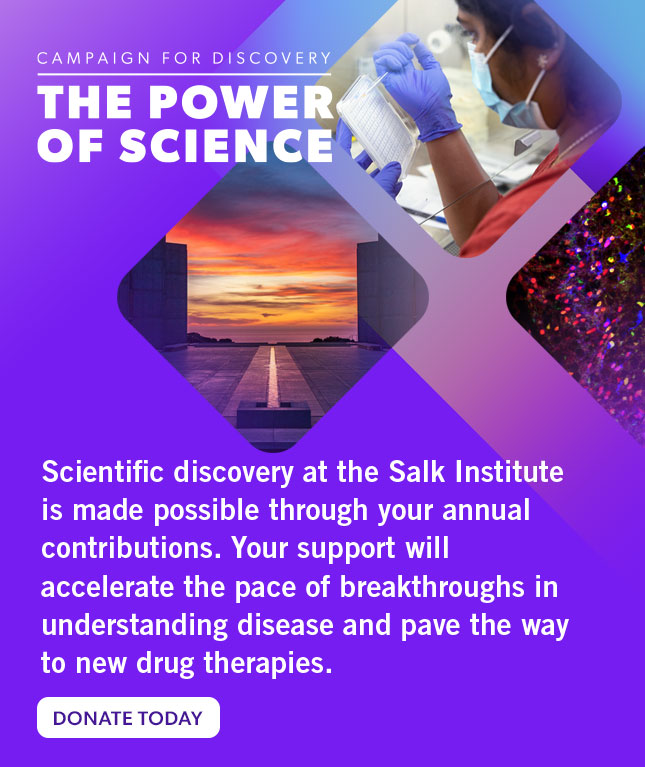Next Gen Austin Coley Shaping academia for future scientists
Austin Coley, though only at Salk since 2019, has already taken an active role in everything from conducting innovative research on the brain to spearheading a wide variety of outreach activities.
Coley grew up in multiple towns in New Jersey as his family moved to seek better opportunities and avoid troubled neighborhoods. He was a star football player in high school, but the summer after his senior year he experienced a life-altering injury.
“My first love was football,” says Coley. “But I wrecked my hamstring, so I could no longer play. My entire life changed.”
Outside of football, Coley had always enjoyed biology and anatomy classes. “Understanding how the body worked and how diseases affected the body fascinated me,” he says. So, he started exploring university biology programs.
The historically Black college and university (HBCU) North Carolina Central University caught his attention, as it offered a brand-new science complex and enthusiastic faculty. Once there, despite his excitement for biology, Coley struggled with his first exams.
“I had come to college to study science, yet I failed my first round of biology and chemistry exams. I was scared,” he shares. “I decided that I would learn how to study and really apply myself for the next exams. This would be my last shot. If I failed again, I would drop out of the major.”
Coley threw himself into his academics. He spent his days in the library, deciphering chemical equations and memorizing biological definitions. He aced his next exams.
After undergrad, Coley went on to complete his master’s degree in cell physiology at Case Western Reserve University but was disappointed with the lack of support, encouragement and representation of Black scientists in his program. When he applied for his PhD in neurobiology at Drexel University College of Medicine, Coley knew he wanted to be in a lab that championed minorities in science. Professor Wen‑Jun Gao welcomed Coley into his lab to work on the molecular components involved in schizophrenia.
“When I was growing up, my uncle was diagnosed with schizophrenia, but I had no idea. We didn’t talk about his condition in my family, as there is a stigma around mental health in the Black community,” says Coley. “I want to uncover the neural mechanisms of schizophrenia to improve our understanding of the disease, mental health awareness and outcomes.”
In his third year in graduate school, Coley came to San Diego to attend the Society for Neuroscience annual conference, where he learned about a new award to fund minority researchers on their path to full-time faculty positions: the NIH Blueprint Diversity Specialized Predoctoral to Postdoctoral Advancement in Neuroscience Award. Coley was the perfect fit.
Winning the award jump-started Coley’s career, as it funded the last two years of his PhD and provided funding for his entire postdoctoral studies. With independent funding, Coley could choose nearly any scientist in the country to work with for his postdoc, and he chose renowned neuroscientist and Salk Professor Kay Tye.
“Kay offered to support not only my scientific interests, but also my social justice activities outside of her lab. It was clear that she believed in me,” says Coley.
In the Tye lab, Coley is now studying the populations of neurons that are affected in anhedonia, the inability to experience pleasure, which is a core symptom of schizophrenia and depression. He is using calcium imaging techniques to examine the neurons in the frontal lobe of the brain, called the prefrontal cortex. His goal is to see if manipulating certain neurons in the prefrontal cortex helps alleviate symptoms of schizophrenia and depression.
Outside of the lab, Coley is also an active member of Salk’s community. Currently, he is co-chairing the newly formed Black Association at Salk (BAS), which aims to unite and support Black employees through social hours, speakers and professional development opportunities. He is also working with Salk’s Diversity and Inclusion Task Force to invite more Black speakers to the weekly seminar series.
“Exposure is the best thing to change attitudes. People need to see that there are successful Black scientists in academia,” says Coley. “I would love to be a quiet scientist, focus on my work and go home, but right now I need to do everything I can to improve the scientific ecosystem for the next generation of Black scientists.”
Featured Stories
 Leading Salk science into the futureInside Salk sat down with Rusty Gage to learn more about his background, approach to managing a world-renowned Institute, and vision for Salk science over the next decade.
Leading Salk science into the futureInside Salk sat down with Rusty Gage to learn more about his background, approach to managing a world-renowned Institute, and vision for Salk science over the next decade. Julie Law – Revealing RNAAssociate Professor Julie Law shares common themes underlying her research and discusses what motivates her both in and out of the lab.
Julie Law – Revealing RNAAssociate Professor Julie Law shares common themes underlying her research and discusses what motivates her both in and out of the lab.
 Gerald Pao – Pushing the limits in science and lifeFrom studying the novel coronavirus to downloading brains to computers, Staff Scientist Gerald Pao is at the forefront of scientific advancement.
Gerald Pao – Pushing the limits in science and lifeFrom studying the novel coronavirus to downloading brains to computers, Staff Scientist Gerald Pao is at the forefront of scientific advancement. Austin ColeyAustin Coley, though only at Salk since 2019, has already taken an active role in everything from conducting innovative research on the brain to spearheading a wide variety of outreach activities.
Austin ColeyAustin Coley, though only at Salk since 2019, has already taken an active role in everything from conducting innovative research on the brain to spearheading a wide variety of outreach activities. Salk’s Harnessing Plants Initiative (HPI) Garners Widespread SupportNew grants are supporting the Institute’s efforts to optimize plants’ natural ability to store carbon and mitigate climate change. This support bolsters the ongoing HPI project focused on model plants that was funded through donations to The Audacious Project in 2019.
Salk’s Harnessing Plants Initiative (HPI) Garners Widespread SupportNew grants are supporting the Institute’s efforts to optimize plants’ natural ability to store carbon and mitigate climate change. This support bolsters the ongoing HPI project focused on model plants that was funded through donations to The Audacious Project in 2019.




















































